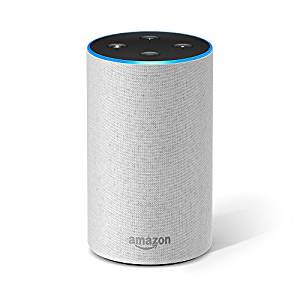In an age where we are increasingly surrounded by smart technology it is often difficult to keep up with all their uses and applications. I have to thank the son of a patient I saw recently who pointed out a simple yet potentially really beneficial use of the latest gadgets appearing in our homes – the smart speaker.
This gentleman had attended my clinic with his father who was in a very worrying situation with his vision. The patient was blind in one eye, has moderate glaucoma in his good eye, is on full topical medication, and unfortunately due to dementia was struggling with compliance with his eyedrops. As a result his IOP was poorly controlled and complete blindness was a real risk.
Different options in terms of nurses and carers were being explored, however the patient himself wasn’t keen on this.
Trying to find a solution, the patient’s son bought him an Amazon Echo smart speaker. (I hasten to add there are a range of other high quality devices on the market available, before I get pursued legally by some of the worlds largest companies.) Through the related App for this device he was able to programme daily vocal reminders for his father’s eyedrops. This was set up to be repeated at the appropriate time each and every day.
When they attended the clinic together, his IOP had halved and was now sitting at a level that I felt was clinically safe. Of course this is not scientific or hard and fast proof that this device was solely responsible for this decrease, and close monitoring will determine whether this remains consistently controlled. However I was encouraged by the fact that the patient kept referring to the ‘lady with the bossy voice in the speaker’ constantly reminding him about his eyedrops, which made me feel that he was engaging with this system, albeit being slightly irked by Alexa’s tone. This was offset by the fact he was able to enjoy classical music through the same speaker which was one of his hobbies.
This simple use of one of these devices gave me food for thought and one well worth sharing with fellow clinicians. There are obvious constraints on this use – they cost money, and may not be affordable for all patients/families. They rely on WiFi access, which although most of now take for granted, may not have found its way into the homes of all our elderly population as yet. It probably relies on a family member or a carer taking the time to purchase the device and set up the required reminders. It may also not be as effective for those with hearing impairment, and probably depends upon the patient being within earshot of the device each time.
On the flip-side however there are probably a number of uses for eye patients. The potential to remind patients of their eyedrops is probably the main area this could have a role. I suspect even for patients who don’t have the memory problems of this patient it could be useful. I know that if I was required to take drops 3 times daily, I would struggle to remember. Our glaucoma patients may also have multiple other medications to take each day, making compliance with their glaucoma drops more difficult. Of course reminders for their other medication could be set up in the same way, which would be a useful extension of this.
Does this type of technology almost pose a question for healthcare providers, in that it could in certain circumstances, be a viable and affordable alternative to overstretched nursing and care staff?
Thinking of patients with reduced vision, smart speakers may also have their uses in replacing writing and typing to some degree. They could compile memo’s, shopping lists and messages for their families or carers. Also as a source of entertainment, they can access radio, music, audio books and keep up to date with the news and weather on these devices.
I’m sure this is an area which some readers have already explored in much more detail and have found great applications for. It would be great to share these, either by commenting directly on this post or on this article post on the Optometry-Evolution Facebook page so we can all learn how to get the best out of these new technologies for our patients.
Thank you
Stanley


